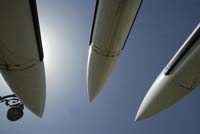USA and Russia cooperate on two nuclear proliferation threats posed by other states
The United States and Russia are working together effectively against nuclear proliferation threats posed by Iran and North Korea, while also exploring follow-ups to two arms treaties that expire within five years, the U.S. ambassador to Moscow said.

William Burns on Thursday praised U.S. and Russian efforts to reduce stockpiles of nuclear weapons and improve security at nuclear facilities, but said both countries should undertake further efforts.
"There never has been a moment when America and Russia, still possessing nuclear capabilities and responsibilities that no other nations can match, have had a greater opportunity to demonstrate real leadership. It would be a huge mistake, not only for the two of us but for the sake of global order, to miss that opportunity," Burns said in a speech at the Carnegie Moscow Center.
"Meanwhile, the United States and Russia are cooperating effectively on the two most immediate nuclear proliferation threats posed by other states, namely North Korea and Iran. We seek in both cases through diplomatic means to stop the spread of weapons and avoid a very dangerous threat to international stability," Burns said.
With both Iran and North Korea, Russia has been seen as emphasizing negotiations and avoiding ultimatums. Moscow has repeatedly spoken out against the use of military force against Iran, and has warned that harsh punishment would be counterproductive.
As part of strengthening cooperation on nuclear issues, Burns said both sides should "look ahead to the challenges and possibilities that lie beyond the expiration of the START treaty in 2009 and the Moscow Treaty in 2012.
"At the direction of our presidents, we have begun a strategic security dialogue to consider what we want in place when the START Treaty expires, what further steps to pursue and what sort of transparency and confidence-building regime makes the most sense," Burns said.
Burns' comments come amid growing unease in Moscow about the United States' intentions and policies in several different spheres. Russian officials have been particularly upset by Washington's plans to base missile defense system elements in the Czech Republic and Poland, which borders Russia.
Russian Defense Minister Sergei Ivanov last month called for the repeal of the Intermediate-Range Nuclear Forces treaty negotiated between Soviet leader Mikhail Gorbachev and U.S. President Ronald Reagan in 1987.
Some observers said the call was meant as a retaliatory measure to the proposed U.S. missile defense plans, the AP reports.
In Brussels Thursday, the top U.S. general in charge of the missile defense project said Russia's call for scrapping the treaty had nothing to do with the U.S. plans.
"There is no link between a missile defense site in Poland and an INF Treaty withdrawal by the Russians that we can see," said Lt. Gen. Henry A. Obering, director of the U.S. Missile Defense Agency,
"If this is something that the Russians are intent on doing that is something they are pursuing for other reasons," he said.
In the latest in a series of alarmed statements by top officials in Moscow, Deputy Foreign Minister Alexander Grushko warned that Russia would be forced to take unnamed countermeasures if the missile defense system is deployed.
"If we fail to ensure predictability, openness and trust in the missile defense field, the worsening of the international situation will affect security interests of a large number of nations," Grushko said in a statement posted on the Foreign Ministry's Web site. "In the modern world, security is indivisible. You can't ensure your own security if you provoke other nation's concerns about their security."
Subscribe to Pravda.Ru Telegram channel, Facebook, RSS!


